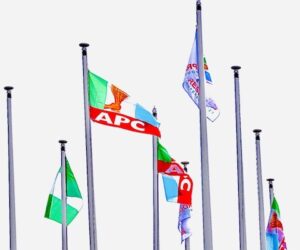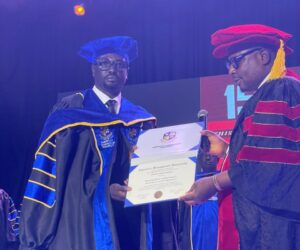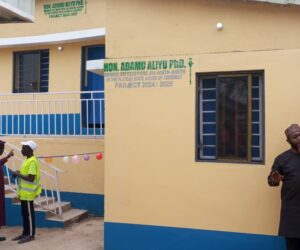In a bold stride towards industrial rebirth, Nigeria’s steel sector is experiencing a renaissance, driven by strategic reforms, visionary leadership, and the firm commitment of President Bola Ahmed Tinubu’s Renewed Hope Agenda. At the helm of this transformation is the Minister of Steel Development, Prince Shuaibu Abubakar Audu, whose two-year tenure has redefined the trajectory of Nigeria’s steel industry.
Once a symbol of unfulfilled potential, the steel sector is now being repositioned as a cornerstone of national development, economic diversification, and regional competitiveness. Central to this revival is the Ajaokuta Steel Complex, long dormant but never forgotten.
It would be recalled that in September 2024, Minister Audu signed a landmark Memorandum of Understanding (MoU) with the original builders of the plant—marking a historic step towards its completion and operation. This strategic move to reignite the Ajaokuta Steel Complex, typically driven by the Kogi-born seasoned technocrat and polished politician, is laudable. However, with the Russia-Ukraine war disrupting previous partnerships, Nigeria is now looking to strategic partnership with China to expedite the revival of the steel plant.
Recognising that steel production cannot thrive without reliable energy, the Ministry of Steel Development under the visionary leadership of Prince Shuaibu Abubakar Audu facilitated a landmark $500 million investment by the Nigerian National Petroleum Company Limited (NNPCL) and its partners for the establishment of five mini-LNG (Liquefied Natural Gas) plants within the Ajaokuta Steel territory. More than just a power solution, this innovation guarantees uninterrupted operations, lowers emissions, and reduces production costs—creating a ripple effect of economic activity across Kogi state and beyond.
Steering the steel sector revival, Audu continues to gain investors’ confidence – from Inner Galaxy Group’s $400 million Stellar Steel Plant in Ogun state to the Orbit Galvanised Steel Plant already churning out products, private capital is flowing into steel like never before. These are not promises on paper; they are factories on the ground, jobs being created, and hope being restored.
The groundbreaking of the Inner Galaxy Group’s Stellar Steel Plant, a $400 million investment in Ogun state by the minister signals growing investor confidence. Expected to be commissioned by April 2026, the plant will significantly boost domestic steel production and job creation. Meanwhile, the commissioning of the Orbit Galvanised Steel Plant, with an estimated annual turnover of $100 million, adds capacity for producing fabricated towers for telecom infrastructure, supporting indigenous projects and exports.
In line with President Tinubu’s national security priorities, Audu also pioneered a groundbreaking partnership with the Defence Industries Corporation of Nigeria (DICON) to use Nigerian steel for the local production of rifles, helmets, and vests. Once abandoned, Ajaokuta is now being transformed into a symbol of sovereignty and strength.
Prince Audu is not just fixing the present; he is building the future. With a 10-year in-house roadmap developed by the Ministry, the Minister has laid the foundation for the production of 10 million tonnes of steel annually, creating over half a million jobs and driving Nigeria toward its $1 trillion GDP vision by 2030.
Also worthy of commendation are efforts led by the vibrant minister to re-operationalise the Aluminium Smelter Company Limited (ALSCON) and Delta Steel (now Premium Mines and Steel Limited), expanding Nigeria’s metallurgical footprint. The current management of ALSCON will be investing the sum of $465 million over a period of six years to achieve full capacity utilisation of the plant, while Delta Steel has committed to begin rehabilitation and operations within 18 months.
Consistent with Tinubu’s pro-business stance, the ministry has actively incorporated private players into the revival strategy. The AIG Group has invested $600 million in a 900-hectare iron ore mine in Gujeni, Kaduna State, while KAM Holdings continues to expand its multi-million-dollar operations in Ilorin and Sagamu.
This inspiring development, which gives insights into Audu’s superlative business acumen, speaks to the current administration’s reform, which aims to anchor a reinvigorated private sector as a catalyst of national development. Indeed, the AIG Group’s investments reflect growing confidence in Nigeria’s industrial policy and the enabling environment created by the Renewed Hope Agenda.
To anchor these reforms, the ministry is partnering the National Assembly towards the passage of the Nigerian Metallurgical Industry Bill 2023, providing the legal framework for long-term sustainability.
Crowning these efforts was the maiden National Steel Summit, which convened key stakeholders to chart a consensus roadmap for the sector. The summit set ambitious targets: creating over 500,000 direct and indirect jobs, producing 10 million metric tonnes of liquid steel annually, and contributing significantly to Nigeria’s $1 trillion GDP goal by 2030.
Under President Tinubu’s Renewed Hope Agenda and Audu’s dynamic leadership, Nigeria’s steel industry is no longer a relic of missed opportunities but a beacon of industrial resurgence. With strategic investments, international partnerships, and a clear roadmap, the country is poised to become a steel hub for Sub-Saharan Africa.
The reassuring outcomes we are witnessing at the Ministry of Steel Development today are only possible because of the political will of Mr President. This powerful combination of President Bola Ahmed Tinubu’s Renewed Hope Agenda, driven by bold economic reforms and industrial revitalisation, and Minister Shuaibu Abubakar Audu’s strategic, hands-on leadership in the steel sector is emblematic of Archimedes’ timeless declaration: “Give me a lever long enough and a fulcrum on which to place it, and I will move the world.”
President Tinubu’s transformational policy initiatives, accentuated by Audu’s strategic execution, are certainly shifting the weight of Nigeria’s industrial destiny and repositioning the nation from decades of inertia to a future of steel-powered sovereignty, economic strength, and continental leadership.








